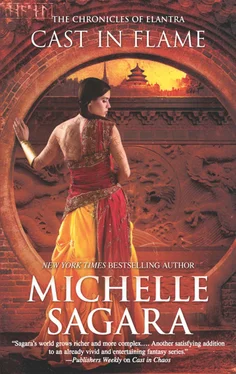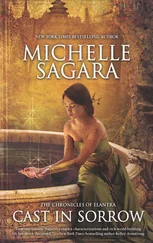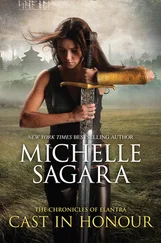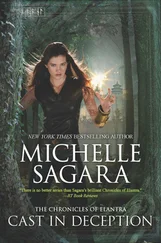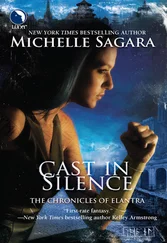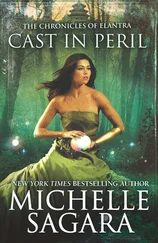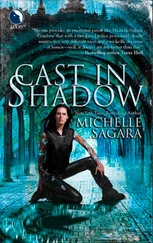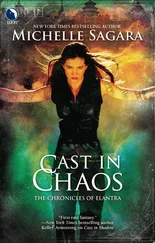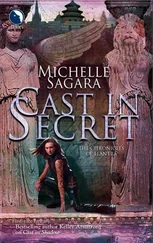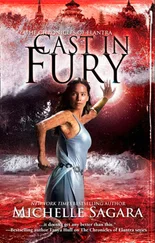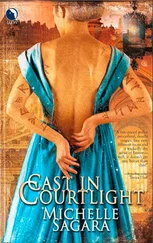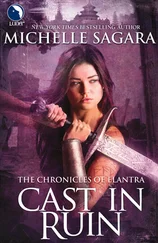The doors swung fully open; nothing leaped through them to attack. Kaylin saw a lot of hall beyond the room itself; it wasn’t brightly lit, but at least there was light. “Teela, tell me about these Barrani ancestors.”
“Tell me,” the Barrani Hawk countered, “why you call them vampires.”
Kaylin shrugged. “They said something about my blood.”
Teela closed her eyes for a couple of seconds, the Barrani equivalent of counting to ten. “They spoke to you.” The words were so flat, they were hardly a question, so Kaylin didn’t answer it. “What color were their eyes?”
“Teela, it was a long time ago.”
“It was months ago. Not even mortal memory is that bad. Please do not tell me you don’t remember.”
But she didn’t. “They were pale, even for Barrani. But perfect the way Barrani are. When we approached the door they guarded, Nightshade told them it had to be opened. Their eyes were closed until he spoke; they opened. But nothing else about them moved—not at first.” She tried to remember her first—and only—walk through the Long Halls, as Nightshade called them. She could clearly see the Barrani standing to either side of the door like perfect statues. She couldn’t, however, see the color of their open eyes. “They must have been blue,” she finally said. “I’m sure I would have noticed if they were a different color. Green would have made them harmless. Relatively,” she added.
“Were you bleeding at the time?”
“Maybe. I wasn’t bleeding enough that it was significant.” Kaylin hesitated. Severn held his weapons; she kept her hands on her daggers, but didn’t draw them. “They asked Nightshade to give me to them as price for passage.”
Teela’s eyes were, of course, midnight blue, so it couldn’t get any worse. “Passage through what?”
“Doors. They were door guards.”
“They were not simple door guards. Do you know where these doors were?”
“Yes.”
“Could you lead us there?”
“...”
“Could you make certain that you don’t lead us there without some warning?”
“It’s a Tower, Teela, in case you hadn’t noticed.”
Teela began to walk, and Kaylin fell in beside her. At Teela’s frown, she fell back a bit; Teela didn’t want Kaylin playing point. Kaylin didn’t exactly want that position, either.
“I didn’t notice the color of their eyes,” she said, “because of their voices.”
Teela stopped walking. “Their voices were different?”
“Not when they spoke to me or to Nightshade. But—I could hear them talking when we approached. Without, you know, seeing their lips move.”
“I am beginning to understand why you feel boredom is not a fate worse than death,” Teela replied, with a brief pause for a healthy, Leontine curse. “Did Nightshade hear their voices—their non-speaking voices?”
“I didn’t ask him. It was the first time I’d been on the inside of the Castle, and it didn’t seem safe or smart to ask questions. If I heard it, I assume he did.”
That would be an unwise assumption. Amusement had been stripped from his voice; had he been standing beside them, his eyes would have been the same color as Teela’s.
“Kitling, this is very important, and I will strangle you if you cannot answer me clearly. What were they saying?”
Kaylin was an old hand at exposing her throat, although she usually only did it when confronted with a raging Leontine Sergeant. Teela literally growled. “I couldn’t understand them.” Kaylin spoke quietly. “I could hear them, but they sounded entirely unlike any voices I’d heard before. I could identify it as speech—but I couldn’t understand what was being said.
“I’d just come from an underground forest. I’d just touched the leftover echoes of a message from the Ancients—or even an Avatar. I was very disoriented.”
“Fine. Is there anything else you’d like me to know?”
“I’d like you to answer my question, now.”
“It wasn’t a question, that I recall.” Teela exhaled. “The Barrani, like the Dragons, are ancient races. Mortals are relative newcomers. You’ve seen the Lake of Life. I don’t know if you’ve seen the draconic birthing pits—I’m going to assume that you haven’t.”
“I haven’t.”
“I’d suggest you avoid it, although given it’s you I shouldn’t bother—you tend to do the opposite of anything resembling smart.” She murmured something about having three wings, which was an Aerian expression that wasn’t always used to imply innate stupidity. “You’ve probably heard the Barrani Hawks complain about boredom.”
Anyone with functional ears had heard the Barrani Hawks make that complaint. Kaylin nodded.
“The Ancients liked to create. Much of what they created would make no sense to you—it barely makes sense to us. We were not—Barrani and Dragon—the first attempt at creating a self-replicating species.”
“The Shadows—”
“We don’t believe the Shadows were meant to be a distinct species. The Ancients’ sense of either distinct or species, however, is poorly understood. You know that we require words to fully come to life.”
“Names. True names.”
“We require one,” Teela continued. “And the one is drawn from the Lake, by the Lady. Without it, the vessel of our body never wakes. When our ancestors were created, there was no Lady. There were Ancients.”
“Were you like the Dragons, then?”
“In what way? I am not aware that Dragons require two names.”
“They don’t require it. But I think they can contain more.”
“That is a thought you will keep firmly to yourself. Forever.”
“The Dragons were supposed to be made of stone and imbued with life.”
“Yes, well. It’s probably true of the first Dragons. We are not entirely certain that it’s true of the first Barrani. You think of stone as something that can be chiseled into the desired shape; it is why the word stone is used in these tales. The Ancients were not so limited in their building materials. Flesh could be—and was—shaped and changed.”
The Leontines.
“Flesh could be merged and combined, while both living creatures somehow remained alive for the process. But flesh was perhaps a later concept, for the Ancients. You think of them as large, powerful people. Perhaps that is how they appeared to us, when they still walked the world—or the worlds. But it was only a facet of what they were in total, and they couldn’t show us most of their faces. We couldn’t perceive them; couldn’t interact with them.
“It’s my belief—and I am not a sage—that they could speak to us and we could not hear them unless they chose a form with which we could interact. We could not see them, unless they chose to confine themselves or diminish themselves in a similar fashion; we were too slender, too fixed, and too small.”
“I’m guessing that’s not the popular view among the Barrani.”
“It is accepted as probable history. Popularity has very little to do with it. The earliest of our kin were not concerned with keeping records for their possible descendants.”
“Did they have descendants in the traditional sense? Like, children, grandchildren, that kind of thing?”
“Not most of them, no.”
“Then why are they even called Barrani?”
“Because we lived in the cities they built. They were not like us, Kaylin. You hate Arcanists. You wouldn’t have a word for what the ancestors were. But it is believed that they were not possessed of single, true names, but complex phrases. When the ancestors were bored, they had options to alleviate that boredom that are undreamed of by the rest of my people now.
“One of them historically involved destroying the rest of us.” At Kaylin’s sharp intake of breath, Teela shrugged. “They did not see it as destruction; they wished to take control of the words that gave us life, and to remake them in some fashion.
Читать дальше
